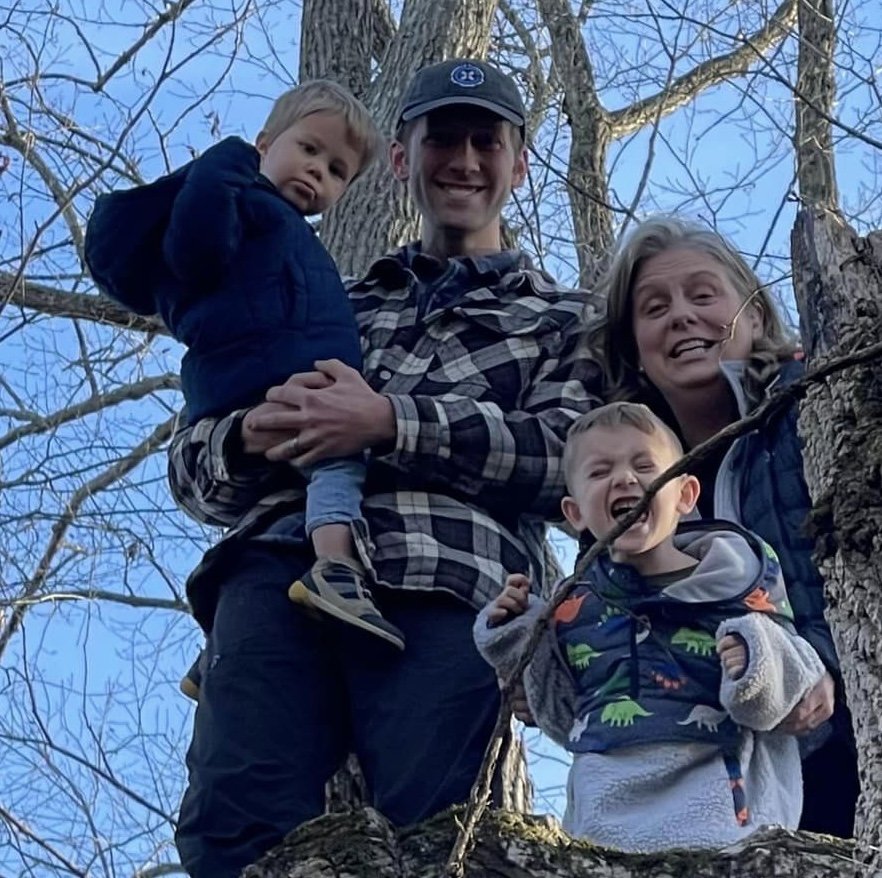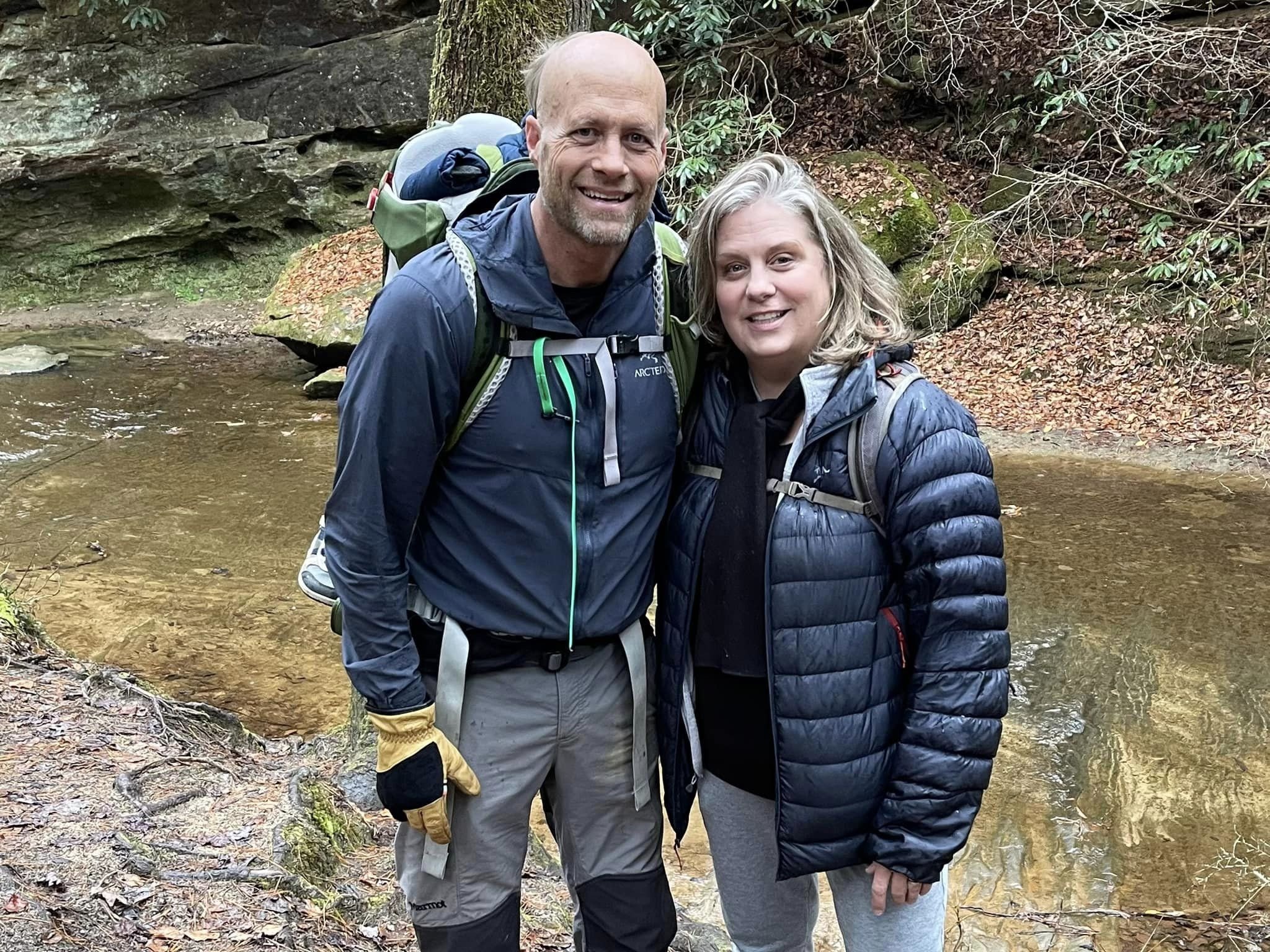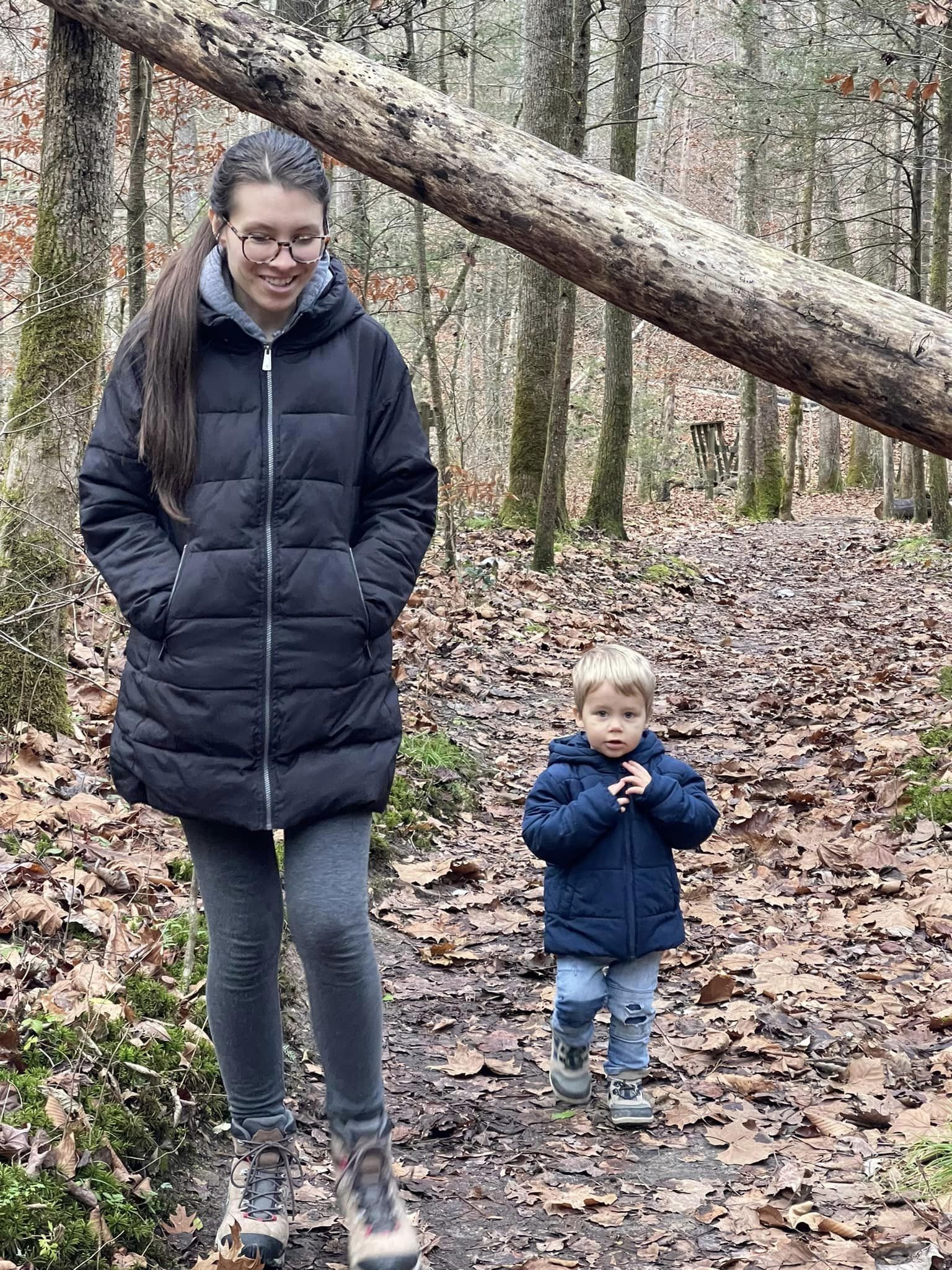The Thrill of God's Perspective
Sutton, in the parking lot, getting ready for the hike.
The full video of this teaching is available at the bottom of this post and this link.
A HIKING TODDLER
A family hike unfolded in Kentucky, starring the family's youngest and most spirited member, Sutton. At just 23 months old, you should've seen him go. At the start of the hike, he moved like a squirrel on espresso. I deliberately shortened my steps, creating a playful rhythm he could keep up with (linked to YouTube video). This simple act of understanding his abilities kept Sutton's spirit alive and his tiny feet moving.
We knew the excitement would wear off soon enough for him, and we didn't want the trail turning into a drag. So we each turned the hike into a series of little games for Sutton, each designed to renew his enthusiasm and urge him forward. Chase, bump into trees, shake water off branches onto each other, and the cutest - Hide and Seek. It was so cute because if two-year-olds close their eyes, they believe they are hidden.
But always remember, toddlers can turn the simplest tasks into colossal challenges. To him, some moments of the hike felt overwhelming, even torturous. He probably felt like we wanted something FROM him, that we were coercing him on a trek he had no desire to undertake. He had no way of knowing we had picked a trail to give him the best chance of success. He couldn’t understand that we were protecting him and guiding him. He could not perceive that his misery was not our goal. He didn’t understand any of that, yet his capacity to navigate the unpredictable world expanded with each step. We didn’t want anything FROM him. We wanted something FOR him: to learn the values found in hiking.
Just as Sutton might have felt we were imposing demands on him during the hike, we can sometimes believe that our relationship with God is primarily about following rules and meeting expectations. We might see our spiritual journey as a series of obligations God wants from us: to follow the rules and keep up appearances. This viewpoint can make our faith a burdensome trek. However, let's jump into Romans 14:17 to uncover a more profound understanding that God wants something FOR us more than He wants something FROM us.
“For the Kingdom of God is not a matter of what we eat or drink, but of living a life of goodness and peace and joy in the Holy Spirit.” Romans 14:17
LIVING A LIFE OF GOODNESS
The essence of God's Kingdom extends beyond mere dietary restrictions or external rituals. Apostle Paul's message to the Roman church, embroiled in conflicts over such practices, redirected their focus from the minutiae of religious observances. God’s kingdom is not grounded in a checklist of do's and don'ts but as a transformative journey marked by a deeper connection with God and others. It's a journey where external practices are not the end goal; instead, they serve as conduits to experiencing goodness, peace, and joy.
This goodness (δικαιοσύνη, dikaiosyne) transcends our pathetic attempts at moral perfection. God does not want goodness FROM us. He wants goodness FOR us. This shift in focus moves us away from incorrectly viewing God as a stern taskmaster demanding adherence to a rigid moral code. Instead, Paul reveals that God desires to cultivate a goodness in our lives that enriches others and ourselves. The teachings of Jesus are not burdens but are pathways to a more profound, holistic way of living.
Just as Sutton might have seen our hike as a series of demands to keep moving, we can mistakenly view our relationship with God as a checklist of moral obligations. However, just as we chose a path for Sutton to ensure his success and joy, God leads us not to burden us with rules but to nurture goodness within us. The games played to keep Sutton engaged and moving forward mirror how God's teachings and commandments are not burdens to weigh us down but are designed to bring us joy and growth. God's desire is not for us to struggle to meet His standards but to walk with Him, helping us grow and journey with Him in goodness (righteousness).
LIVING A LIFE OF PEACE
The peace (εἰρήνη - Greek) in Romans 14:17 carries the same concept as the Old Testament’s use of Shalom (שָׁלוֹם - Hebrew). It is not about the absence of conflict. It encompasses a broader sense of wholeness, completeness, tranquility, and well-being - even during conflict and turmoil. It carries connotations of harmony and reconciliation, particularly in the relationship between humans and God and among individuals.
This peace is not self-contained; it spills over into our relationships with others. It calls us to be agents of reconciliation. In our divided and tumultuous world, God's peace in the lives of Christians stands as a beacon of hope, a reminder that despite the disorder around us, we can find tranquility and purpose. This peace is accomplished FOR us through our relationship with Christ. It is not something God wants FROM us. We cannot create this peace by our force of will. It is a peace we receive FROM God. “Glory to God in the highest, and on earth peace, goodwill toward men!” Luke 2:14
LIVING A LIFE OF JOY
Joy (χαρά, chara) is not contingent on external situations or fleeting moments of pleasure; instead, it is a deep-seated, persistent undercurrent of contentment and hope that remains steadfast regardless of life's changing circumstances. Joy is something God wants FOR us and not FROM us! Unlike the happiness that comes and goes with our external conditions, biblical joy is a manifestation of God working in our lives.
In the biblical sense, joy transcends the fleeting nature of happiness. It's a lasting contentment and hope that persists through varying life circumstances. This joy, deeply rooted in the assurance of God’s love and the stability of His promises, is more than a feeling. It's a gift from God, reflecting His commitment to our overall well-being, not just temporary pleasures. Unlike happiness, which depends on external factors, this joy thrives even amid difficulties.
As his grandpa, I desire Sutton to discover not just the simple pleasure of a walk in the woods but a deeper sense of joy in his relationship with his family. This wasn't about the fleeting excitement of a new environment or the temporary thrill of exploration. It was about planting the seeds of a lifelong appreciation for family, God’s creation, and enduring contentment in being part of something larger than himself.
My role as Sutton's grandpa mirrors God's desire for us to experience true joy. I do hope he finds moments of happiness in the simple act of walking among trees. But, much more important to me is for him to learn that I do not want joy FROM Sutton; I want joy FOR him! The same is true for God and you!
SEEING FROM GOD’S PERSPECTIVE
My grandson's adorable belief that closing his eyes makes him invisible (YouTube video linked) is a charming example of a typical stage in early childhood development known as "egocentrism." This concept describes a stage where young children, typically around the age of 2, cannot differentiate between their perspective and that of others.
At this tender age, Sutton navigates a world where his understanding is entirely self-focused. He assumes that we can't see him if he can't see us. His own direct experiences and sensations guide his reasoning without yet being able to consider the viewpoints or perspectives of others.
This phase is an essential part of cognitive development and shows that my grandson is exploring and learning about his environment in the most natural way for his age. As he grows and his cognitive abilities continue to develop, he'll understand that closing his eyes doesn’t affect what others can see.
Similarly, we often start with egocentrism in our spiritual walk, focusing primarily on what God wants FROM us. We often see our faith as a series of commands and rules we must adhere to. As we mature, we learn that God’s commands and guidance are more about what He wants FOR us. Jesus's moral teachings are not given to burden us but to nurture the life he wants FOR us - goodness, peace, and joy even amidst a world in turmoil.
Seeing what God wants FOR us from his perspective in Romans 14:17 and Luke 2:10-14 transforms our faith from a checklist of obligations into a journey of discovery of the life God wants FOR us!
©2023 Greg McNichols, All rights reserved.
Click here to connect with Greg McNichols - Bio and Links.









